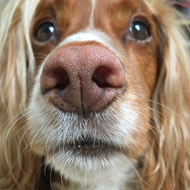Dogs trained to detect malaria from socks

Dogs were able to identify 70 per cent of the malaria-infected samples (Stock photo).
Dogs could hold the key to the first non-invasive test for malaria, new research suggests.
Scientists have discovered that dogs can detect the disease in samples of socks worn by infected children. The finding could pave the way for deploying dogs at ports of entry to prevent the disease spreading across borders.
The research team used nylon socks to collect odour samples from apparently healthy children aged five to 14 years in the Upper River Region in The Gambia. They also used a simple finger-prick test to determine if they were infected with malaria.
Sock samples were then sent to the Medical Detection Dogs (MDD) charity in the UK, where dogs were trained to distinguish between the scent of infected and uninfected samples.
Out of 175 sock samples, 30 were infected with malaria. Early research shows the dogs were able to identify 70 per cent of the malaria-infected samples, and 90 per cent of malaria-free samples.
Principal investigator Professor Steve Lindsay, from Durham University, commented: “While our findings are at an early stage, in principle we have shown that dogs could be trained to detect malaria infected people by their odour with a credible degree of accuracy.”
Co-author Dr Claire Guest, CEO of MDD, said she is “delighted” with the early results.
“The possible potential to train dogs to detect tropical disease where diagnostics are poor, such as leishmaniasis and trypanosomiasis is huge,” she added.
“I believe that this study indicates that dogs have an excellent ability to detect malaria and if presented within an individual infected with the parasite or a piece of recently worn clothing, their accuracy levels will be extremely high. This is a reliable, non-invasive test and is extremely exciting for the future.”
Since 2000, six countries have been certified malaria free, while another 12 reported no cases originating in their borders. However, global progress in tackling the disease has stalled, with an estimated 216 million cases in 2016 - an increase of five million compared to the previous year.
Co-author Professor James Logan, from the London School of Hygiene and Tropical Medicine, said: “… We desperately need innovative new tools to help in the fight against malaria.
“Our results show that sniffer dogs could be a serious way of making diagnosis of people who don’t show any symptoms, but are still infectious, quicker and easier.”



 The Animal and Plant Health Agency (APHA) has updated its online reporting service for dead wild birds.
The Animal and Plant Health Agency (APHA) has updated its online reporting service for dead wild birds.